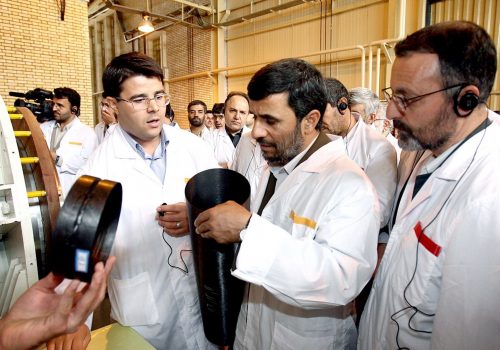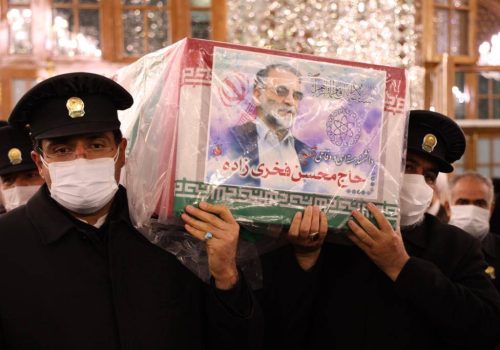Netanyahu’s Iran policy is expected to fail—again
Immediately upon Benjamin Netanyahu’s entry into the prime minister’s office for the sixth time in history, his government declared that their goal was to focus on every aspect of the Iranian threat, with its nuclear program at the top of the list.
From Netanyahu’s statements and actions—such as sending Minister of Strategic Affairs Ron Dermer to Washington on January 9—it is clear that the prime minister has not changed his ways regarding the Iran file. Netanyahu intends to continue to oppose any nuclear agreement with Tehran and also continues to emphasize that Israel will not hesitate to thwart Iran’s plans to build a nuclear arsenal.
In this context, Netanyahu seems to mainly focus on strengthening Israel’s ties with the United States, thereby mobilizing world and regional powers to increase political and economic pressure on Tehran. However, what was a difficult task for Netanyahu a few years ago is becoming an almost impossible one in the current international climate due to a host of reasons.
The biggest problem that Netanyahu has today is the fact that he will have a tough time rallying the Joe Biden administration. Although the two countries see eye to eye when it comes to the Iranian threat, and Biden has already pledged that he will not hesitate to attack Iran “as a last resort,” in practice, the gap between Israel and the United States on this issue remains deep. Iran is not at the center of the administration’s dealings; the campaign in Ukraine and the dramatic rise of the Chinese threat are more pressing issues for the administration than Iran.
Furthermore, it seems from the Biden administration’s behavior that, despite the protests in Iran and Tehran’s aid to Russia in its war in Ukraine, additional pressure could destroy the equilibrium created with Tehran and prevent any chance of a future political settlement. This will make it very difficult for Netanyahu and his team to convince anyone in Washington that they’re on the right path.
Additionally, even though senior administration officials understand that the chances of returning to the Joint Comprehensive Plan of Action (JCPOA) are low, they seem to understand that there is no substitute for a political framework that will stop Iran from speeding up its nuclear program. This stands in complete contrast to Netanyahu’s policy, which rules out any negotiations with Tehran. Even if the Biden administration decides to increase pressure on Iran, it will do so with the aim of returning to the deal—not to eliminate any chance of negotiations.
These gaps in policy are only sharpening against the background of the Biden administration’s worries regarding Netanyahu’s Iran policy, and the bitter experience they have with his unwillingness to share Israel’s moves to thwart the Iranian threat.
It is also worth noting that the prime minister’s ability to mobilize the support of American Jews in the campaign against Iran could be eroded if his government passes laws that harm their status in Israel or does things that distance the Jewish diaspora from the state of Israel. Even Israel’s friends on Capitol Hill will find it difficult to work for Netanyahu’s policies (not to mention those who identify with the Democratic party). However, this does not mean that the Biden administration and Israel cannot cooperate on a wide range of issues regarding Iran, as evidenced by their shared concern over strengthening ties between Tehran and Moscow. However, the differences on the nuclear issue remain as they are.
Nevertheless, this is not where Netanyahu’s obstacles end in his efforts to mobilize the world. The Palestinian problem is a significant security and political challenge. The deterioration of the security situation in the West Bank will force the Israel Defense Forces (IDF) to focus its missions there rather than elsewhere, which will likely increase tensions with the international community.
Even if the Netanyahu administration could completely prioritize the Iran nuclear problem, which has only intensified in recent years, it is unclear whether it could significantly impede their adversary’s progress. Since the 2018 US withdrawal from the JCPOA—with the encouragement of the Netanyahu government—Iran has made dramatic progress in enrichment, overcoming every technological obstacle it had in the past and getting it very close to obtaining enough fissile material for a nuclear bomb. This challenges any operative plan and raises the question: is it possible to erase the knowledge gained in Iran even if facilities in Natanz and Fordow disappear from the world tomorrow?
In addition, the strengthening relationship between Russia and Iran may also make it difficult for Israel to increase its covert operations in Tehran from a political and even security standpoint. The Iran that Netanyahu knew—which hardly reacted to sabotage and cyber-attacks—is not today’s Iran. In order to cope with the Donald Trump administration’s maximum pressure campaign, Tehran raised the bar through its “maximum resistance campaign” to regain deterrence and to “balance the equation” with Israel and the West. Unlike in the Hassan Rouhani era, where the main political goal was to preserve the nuclear agreement, Iran under Ebrahim Raisi—with the dominance of the Islamic Revolutionary Guard Corps (IRGC)—is more eager to retaliate against any aggregation. That is why, in the face of future kinetic activities by Israel, there is an increasing danger of war.
If Netanyahu thinks mobilizing regional powers—led by Saudi Arabia—will put pressure on Iran, he should think twice. While Arab countries see Iran as an enemy, they prefer to maintain dialogue channels and an economic relationship with Tehran, understanding that this is the only way to reduce escalation with Iran. These countries are very afraid of a regional military conflict and will find it difficult to support it due to the possible impact on their security.
All these obstacles are furthered by the difficulties Netanyahu faces in mobilizing the Israeli public for a campaign against Iran, particularly when Netanyahu’s actions are widely assumed to be a distraction from his ongoing corruption trial. This suspicion and the widening rift between the right and the left in Israel will increase misgivings of any action the prime minister will take in the Iranian context. As a result, Netanyahu will have a hard time winning automatic assistance from the opposition.
The bottom line, Netanyahu is expected to experience many bumps on his way to convincing the world to respond to the Iranian threat. But what is the strategic purpose of this policy? After all, in recent years, it’s evident that, without a political framework and despite the threats from all sides, Iran has progressed almost unhindered its enrichment program—and in a way that takes the sting out of almost any non-political solution. The ability to roll back the Iranian nuclear threat is extremely unlikely in any scenario. Additionally, Iran reportedly has a consensus regarding its right to enrich; thus, in the foreseeable future, Iran will not dismantle its nuclear facilities under any scenario.
Since 2018, the huge gap between Israel’s Iran policy and the rest of the world’s has only widened. Nevertheless, before Israel gives up and decides to stand alone in the face of the Iranian threat, it is better to rethink the elements of Israeli policy that are currently unrealistic so that they correspond more closely with reality. Moreover, adopting Netanyahu’s policy—while ignoring that the international community has decided that the best and maybe only solution is diplomacy—could lead to, in the best case, the world rushing to sign a deal with Iran and, in the worst case, choosing inaction and leaving Israel isolated.
Danny Citrinowicz is a nonresident fellow with the Atlantic Council’s Middle East Programs. He served for twenty-five years in a variety of command positions units in Israel Defense Intelligence (IDI) including as the head of the Iran branch in the Research and Analysis Division (RAD) in the Israeli defense intelligence and as the division’s representative in the United States. Follow him on Twitter: @citrinowicz.
Further reading
Tue, Dec 8, 2020
A history of continuity in Iran’s long nuclear program
IranSource By Sina Azodi
Iran’s interest in developing a nuclear deterrent is often attributed to the Islamic Republic. However, in reality, this interest predates the 1979 revolution and reflects a deep-seated desire for national prestige and development, as well as a need to deter regional rivals.
Mon, Jun 13, 2022
Israel’s policy toward Iran is failing by ‘a thousand cuts.’ Here’s why.
IranSource By Danny Citrinowicz
There is a growing gap between the statements of senior Israeli officials and the reality on the ground.
Mon, Mar 21, 2022
Israel and Iran need to turn down the heat. The UAE could be the best choice as conduit.
IranSource By
The UAE could help defuse tension with Iran at a time when Israeli military activity in Syria continues against Iran.
Image: Israeli Prime Minister Benjamin Netanyahu speaks during a news conference at the Ministry of Defence in Tel Aviv, Israel, April 30, 2018. REUTERS/Amir Cohen TPX IMAGES OF THE DAY


